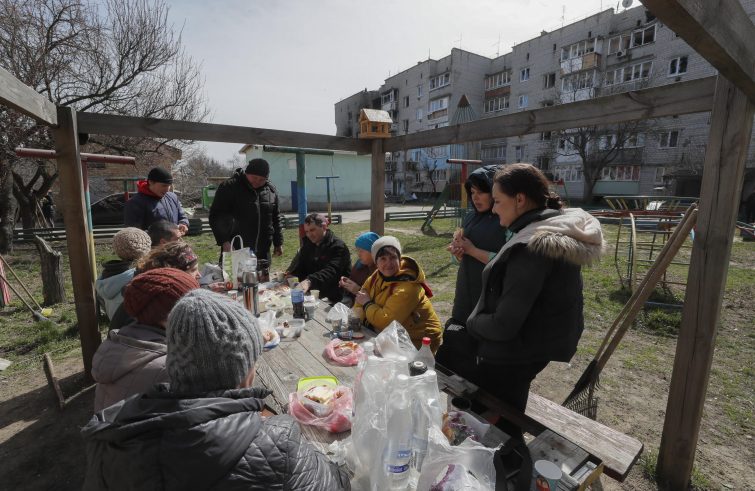
“In Kiev and Žytomyr a lot of people have returned home. We know that two-thirds of the population has returned to the capital. But the mayor of Žytomyr is telling people to wait until the end of the war because it is still not safe there. Yesterday for example, our people hit the Russian missile cruiser Moskva and the Russians are angry. Tonight the sirens sounded all the time and in all regions of Ukraine. They definitely hit something but our government does not give precise news in order not to spread sensitive information. That’s why the mayor is asking not to return, but people want to go home. Churches are full, even if there are few children, teenagers and young people around”. This is how Holy Week is in the Kiev region, amidst the sound of sirens, falling bombs and the constant threat of new attacks. Mgr. Oleksandr Jazlovetskyi, auxiliary bishop of the diocese of Kiev-Žytomyr tells the story to Sir. We caught up with him on the phone as he was in church. He was meditating. He immediately confided:
“It is hard to prepare homilies this year because you have to interpret the Word of God but also adapt it to our circumstances. You can’t just explain the Gospel and sit back. People are waiting for words of courage, of comfort. I spoke with other priests and they confided in me this difficulty.”
What are you going to say?
For a few days now I have been thinking about the homily for the Easter Vigil on Holy Saturday. Regional TV will be here and we need to think about what to say to those who generally don’t come to church. I was thinking of saying that this Easter is a bit like the Easter of the first Christians: they too were under Roman occupation, they too were afraid, like we are today. It is undoubtedly a very different Easter this year.
In years past, people came to church to celebrate a holiday, everyone was dressed up and elegant. Today, you cry, you cover up.
What are the “crosses” that have hurt you most in these 50 days of war?
I heard many bombs fall and I also went to the places where they fell. It is difficult, however, to say which faces of the crosses struck me the most. The children in the shelters come to mind, sitting around waiting for the alarm to end. People reciting rosaries under the bombing. The crying of mothers for their raped and murdered daughters. The funerals. For people it is very painful. They think that what they are experiencing is an unjust suffering. This injustice is perhaps the biggest cross that takes in all the others. The Russians have accused us of fascism, of Nazism, of persecution of the Russian language, but here, even personally, one does not understand these accusations. They say they came to defend the Russian population, but we cannot really understand their motivation. It is this injustice that hurts.
If you at least understand and know what your faults are, you can make sense of what you are experiencing and you can even apologize. But here we are very close to the suffering of Christ who was condemned to death through no fault of his own.
The war is spreading feelings of hatred in people’s hearts, as well as the wreckage. Are you worried?
I don’t see a generalized hatred. I see for example a woman crying because her daughter of only 16 years old was raped and killed or because her husband was killed.
I see tears, more than hate.
Even when I talk to the priests who are hearing confessions, when I talk to the faithful, they understand that one day we will be asked to forgive. The Russians are and will be our neighbors but this moment will and can only come the day the war ends.
What will you ask of the Risen Jesus on Easter Sunday?
The Resurrection of every Christian and the Resurrection of Ukraine. So many countries have experienced war and when it ended, nothing changed. On the contrary, war has often exacerbated divisions and wounds. Therefore, I ask the Risen Jesus for the conversion of hearts and the Resurrection of Ukraine. I ask that my country may come out of this war more in solidarity, more believing, more renewed.











